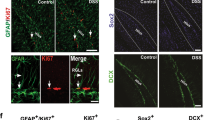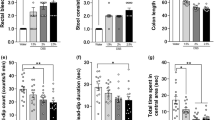Abstract
Neurobehavioral deficits have been severally reported as a comorbid outcome in inflammatory bowel diseases (IBDs). This study evaluated neurological changes in the experimental model of IBDs, as well potential protective effects of methyl jasmonate (MJ). The study used the acetic acid model of colitis and thereafter delayed the healing process by the administration of indomethacin (Indo) (2 mg/kg, SC). Thirty male Wistar rats (120-160 g) were divided into 5 groups (n = 6). Control, Colitis, Colitis + Indo, MJ (50 mg/kg, IP) + Colitis and MJ + Colitis + Indo. Colitis was induced by intrarectal administration of 2 mL, 4% acetic acid. Neurobehavioral studies were carried out to assess memory function, depression, and anxiety on day 7 of post-colitis induction. Animals were thereafter sacrificed to collect the brain tissues for routine histology, immunoreactivity of GFAP and IBA-1, and biochemical assays. Neurobehavioral tests showed anxiety, depression, and memory deficits, especially in the Colitis + Indo group which were accompanied by increased IBA-1 and GFAP count. MJ reversed these effects and reduced GFAP count in the hippocampus and amygdala as well as IBA-1 count in the hippocampus, amygdala, and cortex. Histological observations of these areas showed no significant histopathological changes across all groups. GPx and CAT levels were significantly reduced, while MPO was significantly increased in colitis and Colitis+indo groups when compared with control, which was attenuated in groups administered with MJ. These findings tuggest that MJ possesses neuroprotective, anti-oxidant, and neuron-regeneration properties. Therefore, it could be considered as a potential treatment for behavioral deficits associated with ulcerative colitis.












Similar content being viewed by others
Data availability
The data for this study are available from the corresponding author on reasonable request.
References
Abraham C, Dulai PS, Vermeire S, Sandborn WJ (2017) Lessons learned from trials targeting cytokine pathways in patients with inflammatory bowel diseases. Gastroenterology 152(2):374–388.e4. https://doi.org/10.1053/j.gastro.2016.10.018
Aluko OM, Umukoro S (2020b) Methyl jasmonate reverses chronic stress-induced memory dysfunctions through modulation of monoaminergic neurotransmission, antioxidant defense system, and Nrf2 expressions. Naunyn Schmiedeberg's Arch Pharmacol 393(12):2339–2353. https://doi.org/10.1007/s00210-020-01939-6
Aluko OM, Iroegbu JD, Ijomone OM, Umukoro S (2021) Methyl Jasmonate: behavioral and molecular implications in neurological disorders. Clin Psychopharmacol Neurosci 19(2):220–232. https://doi.org/10.9758/cpn.2021.19.2.220
Besson J, de Carvalho PC, Matioli G, Natali M (2018) Methyl jasmonate: a phytohormone with potential for the treatment of inflammatory bowel diseases. J Pharm Pharmacol 70(2):178–190. https://doi.org/10.1111/jphp.12839
Carabotti M, Scirocco A, Maselli MA, Severi C (2015) The gut-brain axis: interactions between enteric microbiota, central and enteric nervous systems. Ann Gastroenterol 28(2):203–209
Dang HT, Lee HJ, Yoo ES, Hong J, Bao B, Choi JS, Jung JH (2008) New jasmonate analogues as potential anti-inflammatory agents. Bioorg Med Chem 16(24):10228–10235. https://doi.org/10.1016/j.bmc.2008.10.050
Deguchi Y, Andoh A, Inatomi O, Yagi Y, Bamba S, Araki Y, Hata K, Tsujikawa T, Fujiyama Y (2007) Curcumin prevents the development of dextran sulfate sodium (DSS)-induced experimental colitis. Dig Dis Sci 52(11):2993–2998. https://doi.org/10.1007/s10620-006-9138-9
Do J, Woo J (2018) From gut to brain: alteration in inflammation markers in the brain of dextran sodium sulfate-induced colitis model mice. Clin Psychopharmacol Neurosc 16(4):422–433. https://doi.org/10.9758/cpn.2018.16.4.422
El-Akabawy G, El-Sherif NM (2019) Zeaxanthin exerts protective effects on acetic acid-induced colitis in rats via modulation of pro-inflammatory cytokines and oxidative stress. Biomed Pharmacother 111:841–851. https://doi.org/10.1016/j.biopha.2019.01.001
Fujita H, Takahashi S, Okabe S (1998) Mechanism by which indomethacin delays the healing of acetic acid-induced ulcers in rats. Role of neutrophil antichemotactic and chemotactic activities. J Physiol Pharmacol 49(1):71–82
Gharedaghi MH, Rahimian R, Dehpour AR et al (2015) Dinitrobenzene sulphonic acid-induced colitis impairs spatial recognition memory in mice: roles of N-methyl D-aspartate receptors and nitric oxide. Psychopharmacology 232:3081–3090. https://doi.org/10.1007/s00213-015-3950-x
Gunjegaonkar SM, Shanmugarajan TS (2019) Molecular mechanism of plant stress hormone methyl jasmonate for its anti-inflammatory activity. Plant Signal Behav 14(10):e1642038. https://doi.org/10.1080/15592324.2019.1642038
Hanscom M, Loane DJ, Aubretch T, Leser J, Molesworth K, Hedgekar N, Ritzel RM, Abulwerdi G, Shea-Donohue T, Faden AI (2021) Acute colitis during chronic experimental traumatic brain injury in mice induces dysautonomia and persistent extraintestinal, systemic, and CNS inflammation with exacerbated neurological deficits. J Neuroinflammation 18(1):24. https://doi.org/10.1186/s12974-020-02067-x
Harry GJ, Kraft AD (2008) Neuroinflammation and microglia: considerations and approaches for neurotoxicity assessment. Expert Opin Drug Metab Toxicol 4(10):1265–1277. https://doi.org/10.1517/17425255.4.10.1265
Ijomone OM, Nwoha PU (2015) Nicotine inhibits hippocampal and striatal acetylcholinesterase activities, and demonstrates dual action on adult neuronal proliferation and maturation. Pathophysiology 22(4):231–239. https://doi.org/10.1016/j.pathophys.2015.09.002
Ijomone OM, Okori SO, Ijomone OK, Ebokaiwe AP (2018) Sub-acute nickel exposure impairs behavior, alters neuronal microarchitecture, and induces oxidative stress in rats' brain. Drug Chem Toxicol 41(4):377–384. https://doi.org/10.1080/01480545.2018.1437173
Kellermann L, Riis LB (2021) A close view on histopathological changes in inflammatory bowel disease, a narrative review. Dig Med Res 4:3. https://doi.org/10.21037/dmr-21-1
Kim Y, Yoon S, Kim SJ, Kim JS, Cheong JW, Min YH (2012) Myeloperoxidase expression in acute myeloid leukemia helps identifying patients to benefit from transplant. Yonsei Med J 53(3):530–536. https://doi.org/10.3349/ymj.2012.53.3.530
Klein A, Eliakim R (2010) Non-steroidal anti-inflammatory drugs and inflammatory bowel disease. Pharmaceuticals (Basel, Switzerland) 3(4):1084–1092. https://doi.org/10.3390/ph3041084
Kobayashi T, Siegmund B, Le Berre C, Wei SC, Ferrante M, Shen B, Bernstein CN, Danese S, Peyrin-Biroulet L, Hibi T (2020) Ulcerative colitis. Nat Rev Dis Primers 6(1):74. https://doi.org/10.1038/s41572-020-0205-x
Liu F, Wang X, Cui Y, Yin Y, Qiu D, Li S, Li X (2021) Apple polyphenols extract (APE) alleviated dextran sulfate sodium induced acute ulcerative colitis and accompanying Neuroinflammation via inhibition of apoptosis and Pyroptosis. Foods (Basel, Switzerland) 10(11):2711. https://doi.org/10.3390/foods10112711
Minaiyan M, Mahdavi NS, Talebi A (2019) Ameliorative effect of galantamine on acetic acid-induced colitis in rats. Res Pharm Sci 14(5):391. https://doi.org/10.4103/1735-5362.268199
Murakami A, Hayashi R, Tanaka T, Kwon KH, Ohigashi H, Safitri R (2003) Suppression of dextran sodium sulfate-induced colitis in mice by zerumbone, a subtropical ginger sesquiterpene, and nimesulide: separately and in combination. Biochem Pharmacol 66(7):1253–1261. https://doi.org/10.1016/s0006-2952(03)00446-5
National Research Council (US) Committee for the Update of the Guide for the Care and Use of Laboratory Animals (2011) Guide for the care and use of laboratory animals, 8th edn. National Academies Press (US), Washington (DC)
O'Callaghan JP, Sriram K (2005) Glial fibrillary acidic protein and related glial proteins as biomarkers of neurotoxicity. Expert Opin Drug Saf 4(3):433–442. https://doi.org/10.1517/14740338.4.3.433
Odukanmi OA, Salami AT, Ashaolu OP, Adegoke AG, Olaleye SB (2018) Kolaviron attenuates ischemia/reperfusion injury in the stomach of rats. Appl Physiol Nutr Metab = Physiologie appliquee, nutrition et metabolisme 43(1):30–37. https://doi.org/10.1139/apnm-2017-0138
Oh PS, Lim KT (2006) Plant originated glycoprotein has anti-oxidative and anti-inflammatory effects on dextran sulfate sodium-induced colitis in mouse. J Biomed Sci 13(4):549–560. https://doi.org/10.1007/s11373-006-9083-9
Omayone TP, Salami AT, Odukanmi A, Olaleye SB (2018) Diet containing seeds of Buchholzia coriacea accelerates healing of acetic acid induced colitis in rats. Asian Pac J Trop Biomed 8(3):166. https://doi.org/10.4103/2221-1691.227998
Owusu G, Obiri DD, Ainooson GK, Osafo N, Antwi AO, Duduyemi BM, Ansah C (2020) Acetic acid-induced ulcerative colitis in Sprague Dawley rats is suppressed by Hydroethanolic extract of Cordia vignei leaves through reduced serum levels of TNF-αand IL-6. Int J Chronic Dis 2020:1–11. https://doi.org/10.1155/2020/8785497
Rotruck JT, Pope AL, Ganther HE, Swanson AB, Hafeman DG, Hoekstra WG (1973) Selenium: biochemical role as a component of glutathione peroxidase. Science (New York, NY) 179(4073):588–590. https://doi.org/10.1126/science.179.4073.588
Scarpignato C, Hunt RH (2010) Nonsteroidal antiinflammatory drug-related injury to the gastrointestinal tract: clinical picture, pathogenesis, and prevention. Gastroenterol Clin N Am 39(3):433–464. https://doi.org/10.1016/j.gtc.2010.08.010
Silverberg MS, Satsangi J, Ahmad T et al (2005) Toward an integrated clinical, molecular and serological classification of inflammatory bowel disease: report of a working party of the 2005 Montreal world congress of gastroenterology. Can J Gastroenterol 19(supplement A):5A–36A. https://doi.org/10.1155/2005/269076
Sinha AK (1972) Colorimetric assay of catalase. Anal Biochem 47(2):389–394. https://doi.org/10.1016/0003-2697(72)90132-7
Swanson RA, Ying W, Kauppinen TM (2004) Astrocyte influences on ischemic neuronal death. Curr Mol Med 4(2):193–205. https://doi.org/10.2174/1566524043479185
Umukoro S, Ben-Azu B, Ajayi AM, Adebesin A, Emokpae O (2020) Cymbopogon citratus aqueous leaf extract attenuates neurobehavioral and biochemical changes induced by social defeat stress in mice. Chin Herb Med 12(3):303–309. https://doi.org/10.1016/j.chmed.2020.01.002
Ungaro R, Mehandru S, Allen PB, Peyrin-Biroulet L, Colombel JF (2017) Ulcerative colitis. Lancet (London, England) 389(10080):1756–1770. https://doi.org/10.1016/S0140-6736(16)32126-2
Vargas MR, Johnson DA, Sirkis DW, Messing A, Johnson JA (2008) Nrf2 activation in astrocytes protects against neurodegeneration in mouse models of familial amyotrophic lateral sclerosis. J Neurosci Off J Soc Neurosci 28(50):13574–13581. https://doi.org/10.1523/JNEUROSCI.4099-08.2008
Vecchiarelli HA, Morena M, Keenan CM, Chiang V, Tan K, Qiao M, Leitl K, Santori A, Pittman QJ, Sharkey KA, Hill MN (2021) Comorbid anxiety-like behavior in a rat model of colitis is mediated by an upregulation of corticolimbic fatty acid amide hydrolase. Neuropsychopharmacology 46(5):992–1003. https://doi.org/10.1038/s41386-020-00939-7
Yang Z, Wang KK (2015) Glial fibrillary acidic protein: from intermediate filament assembly and gliosis to neurobiomarker. Trends Neurosci 38(6):364–374. https://doi.org/10.1016/j.tins.2015.04.003
Zonis S, Pechnick RN, Ljubimov VA, Mahgerefteh M, Wawrowsky K, Michelsen KS, Chesnokova V (2015) Chronic intestinal inflammation alters hippocampal neurogenesis. J Neuroinflammation 12:65. https://doi.org/10.1186/s12974-015-0281-0
Aluko OM, Umukoro S (2020a) Role of purinergic signaling pathways in the adaptogenic-like activity of methyl jasmonate in rats exposed to unpredictable chronic mild stress. Drug Metab Personalized Ther 35(3). https://doi.org/10.1515/dmpt-2020-0117
Crohn’s & Colitis Foundation (2021) Depression and anxiety. https://www.crohnscolitisfoundation.org/mental-health/depression-anxiety. Accessed 10 Jan 2022
Fokunang C, Fokunang E, Frederick K, Ngameni B, Ngadjui B (2018) Overview of non-steroidal anti-inflammatory drugs (nsaids) in resource limited countries. MOJ Toxicol 4(1). https://doi.org/10.15406/mojt.2018.04.00081
Ijomone OM, Aluko OM, Okoh CO, Ebokaiwe AP (2021) Nω-nitro-L-arginine, a nitric oxide synthase inhibitor, attenuates nickel-induced neurotoxicity. Drug Chem Toxicol 1–10. https://doi.org/10.1080/01480545.2021.1917382
Umukoro S, Aluko OM, Eduviere At, Owoeye O (2016) Evaluation of the adaptogenic-like property of methyl jasmonate in mice exposed to unpredictable chronic mild stress. Brain Res Bull 121:105–114. https://doi.org/10.1016/j.brainresbull.2015.11.016
Acknowledgments
OMI acknowledges the support of the International Brain Research Organization (IBRO) and the International Society for Neurochemistry (ISN). Authors acknowledge the technical support of Ms. Joy Iroegbu, of The Neuro- Lab, Mr. Seyi Olabanji Aleruwa and Mr. Ismail Akanni Oguntade (technologist at the Department of Physiology), School of Basic Medical Sciences, Federal University of Technology, Akure, Nigeria.
Author information
Authors and Affiliations
Contributions
All authors contributed to the study conception and design. Authors TPO, OMA, FTS and JNN were involved in material preparation and data collection. OMI performed histology and immunohistochemistry assays. All authors were involved in data analysis. Faizah Tobi Salami wrote the first draft of the manuscript and all authors made corrections. All authors read and approved the final manuscript.
Corresponding author
Ethics declarations
Ethics approval
Animals were handled according to the Guide for the Care and Use of Laboratory Animals by the National Research Council (US), 2011. The experiments were approved by the Ethics Committee of the University of Ibadan and given the number UI-ACUREC/App/2016/034.
Consent to participate
Not applicable.
Consent to publication
Not applicable.
Competing interests
The authors have no relevant financial or non-financial interests to disclose.
Additional information
Publisher’s note
Springer Nature remains neutral with regard to jurisdictional claims in published maps and institutional affiliations.
Rights and permissions
Springer Nature or its licensor (e.g. a society or other partner) holds exclusive rights to this article under a publishing agreement with the author(s) or other rightsholder(s); author self-archiving of the accepted manuscript version of this article is solely governed by the terms of such publishing agreement and applicable law.
About this article
Cite this article
Omayone, T.P., Salami, F.T., Aluko, O.M. et al. Neuroprotective effects of methyl jasmonate in male Wistar rats exposed to delayed acetic acid-induced ulcerative colitis: involvement of antioxidant status, GFAP, and IBA-1 immunoreactivities. Metab Brain Dis 38, 671–686 (2023). https://doi.org/10.1007/s11011-022-01145-8
Received:
Accepted:
Published:
Issue Date:
DOI: https://doi.org/10.1007/s11011-022-01145-8




